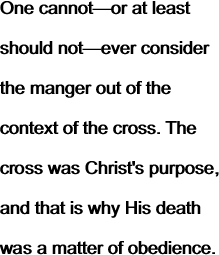 |
|
HOME | PROCLAMATION! MAGAZINE | DEVOTIONALS | STUDIES | LETTERS | ABOUT US | RELATED WEBSITES |
|
HOME / PROCLAMATION! MAGAZINE / 2010 / JANUARY FEBRUARY MARCH / EASTER REFLECTIONS ON "GOD WITH US"
January February March 2010
VOLUME 11, ISSUE 1
A R T I C L E S
Easter reflections on "God with us"

BILL BORN
The Easter season is upon us, and it is simply wonderful! My heart erupts in praise the more I consider how this season came to be. It began with the advent of the Christ-child, my Lord and Savior, Jesus Christ--the helpless infant lying in the dirty manger, and yet the King of Kings and Lord of Lords, the one who was "in very nature God." This truth is captured in the doctrine of the incarnation. As I pause to reflect on that truth, my mind is blown away by the implications for mankind, and I am inspired anew to approach the One in the manger just as the shepherds did: telling others what they had seen and heard, and glorifying and praising God.
The birth of Christ is truly one of the most amazing and incomprehensible events in the narrative of God's plan of redemption. The deeper our understanding of the deity of Christ, the more authentic will be our response of worship throughout the entire year.
The Word became flesh and made his dwelling among us. We have seen his glory, the glory of the One and Only, who came from the Father, full of grace and truth (Jn. 1:14 NIV).
Before we consider the implications of the incarnation, it would be profitable to establish the truth of the doctrine first. The word "incarnation" is not contained in the Bible but has been used by Christians to capture the truths that the Scriptures teach about the deity of Christ; mainly that Jesus was God in human flesh. According to Wayne Grudem in Systematic Theology, "The Latin word incarnare means "to make flesh," and is derived from the prefix in- (which has a causative sense, "to cause something to be something") and the stem caro, carnis, "flesh." Instead of an exhaustive study of the deity of Christ, however, I will attempt to help you "see his glory, the glory of the One and Only." Let this glimpse inspire a response of worship with awe and reverence.
Going in chronological order, we first consider the prophecies by Isaiah.
The virgin will be with child and will give birth to a son, and will call him Immanuel (Is. 7:14 NIV).
The name Immanuel means, "God with us." Again Isaiah prophesies about the identity of the coming Messiah.
For to us a child is born, to us a son is given, and the government will be on his shoulders. And he will be called Wonderful Counselor, Mighty God, Everlasting Father, Prince of Peace (Is. 9:6 NIV).
Herein lies compelling evidence that the Child in the manger is indeed "God with us". Let's examine what the Scriptures declare about the four names attributed to Jesus--and worship! The fullness of God is revealed in Jesus Christ, the Son. He will be called:
1. Wonderful Counselor
All this also comes from the LORD Almighty, wonderful in counsel and magnificent in wisdom (Is. 28:29 NIV).
Worth mentioning here is that Jesus refers to the Holy Spirit as the Counselor who would remain with them after He departed. In this single name we see the mystery of the Trinity--God, Christ, and Holy Spirit all being declared a Wonderful Counselor.
2. Mighty God
For the LORD your God is God of gods and Lord of lords, the great God, mighty and awesome, who shows no partiality and accepts no bribes. He defends the cause of the fatherless and the widow, and loves the alien, giving him food and clothing (Deut. 10:17-18 NIV).
Imagine, the child born in Bethlehem is the Almighty God!
3. Everlasting Father
But you are our Father, though Abraham does not know us or Israel acknowledge us; you, O LORD, are our Father, our Redeemer from of old is your name (Is. 63:16 NIV).
It is too much for me to comprehend that the Everlasting God spoken of by Moses and the Father and Redeemer of old was the child born in the manger.
Before the mountains were brought forth, or ever you had formed the earth and the world, from everlasting to everlasting you are God (Ps. 90:2 ESV).
Again we see the indivisible unity of the Trinity.
4. Prince of Peace
May God himself, the God of peace, sanctify you through and through. May your whole spirit, soul and body be kept blame‚‚‚‚‚‚less at the coming of our Lord Jesus Christ (1 Thes. 5:23 NIV).
Jesus is Lord!
It is clear just from what Isaiah told us about the identity of the child that was to be born that He was in some mysterious way the same as the Almighty God, the LORD, the one and only, YAHWEH. Although surrounded with mystery, it all begins to make sense when we compare Isaiah's prophecy with its fulfillment in Christ, especially considering how the first hand witnesses processed it. No doubt the divinity of Christ amazed the New Testament writers. I wish I could ask each one the question, "When did you come to the understanding that Jesus was LORD?"
The angels declare the identity of the Christ-child in their announcement to the shepherds.
Today in the town of David a Savior has been born to you; he is Christ the Lord (Lk. 2:11 NIV).
Even the Shepherds understood the news to mean something extraordinary about the Savior. We are told that,
When they had seen him, they spread the word concerning what had been told them about this child, and all who heard it were amazed at what the shepherds said to them (Lk. 2:17-18 NIV).
Before the angels' announcement, Elizabeth understood that her son, John, was the forerunner of the Messiah, and therefore declared that Mary's baby, yet unborn, was "my Lord."
In a loud voice she exclaimed: "Blessed are you among women, and blessed is the child you will bear! But why am I so favored, that the mother of my Lord should come to me? (Lk. 1:42-43 NIV).
This is an extraordinary statement concerning the identity of Jesus and must have been based on the Holy Spirit's giving her and Zacharias fresh understanding of the Old Testament prophesies! They knew that their son was the messenger, the forerunner of the Messiah. Matthew points out this fact about John in his gospel.
This is he who was spoken of through the prophet Isaiah: A voice of one calling in the desert, "Prepare the way for the Lord, make straight paths for him"(Matt. 3:3 NIV).
John himself indicated his understanding of Jesus' divinity when he said,
After me comes he who is mightier than I, the strap of whose sandals I am not worthy to stoop down and untie (Mk. 1:7 ESV).
Jesus declared his own identity as LORD.
"I tell you the truth," Jesus answered, "before Abraham was born, I am!" (Jn. 8:58-59 NIV).
Grudem explains this encounter clearly.
Jesus combined two assertions whose sequence seemed to make no sense: "Before something in the past happened [Abraham was], something in the present happened [I am]." The Jewish leaders recognized at once that he was not speaking in riddles or uttering nonsense: when he said, "I am," he was repeating the very words God used when he identified himself to Moses as "I AM WHO I AM" (Ex. 3:14). Jesus was claiming for himself the title "I AM," by which God designates himself as the eternal existing One, the God who is the Source of his own existence and who always has been and always will be. When the Jews heard this unusual, emphatic, solemn statement, they knew that he was claiming to be God. "So they took up stones to throw at him; but Jesus hid himself, and went out of the temple" (Jn. 8:59).
The disciples and apostles also referred to Jesus as Lord and God. John begins his gospel by declaring Jesus as being the eternal Word of God who was, in fact, God. Later he says,
No one has ever seen God, but God the One and Only, who is at the Father's side, has made him known (Jn. 1:18 NIV).
Thomas, upon seeing Jesus after His resurrection, calls him, "My Lord and my God!" (Jn. 20:29 NIV). Peter opens his second letter referring to, "…our God and Savior Jesus Christ…" (2 Pet. 1:1 NIV). Paul says that He is "…Christ, who is God over all, forever praised! Amen" (Rom. 9:5 NIV). Finally, we see a picture in Revelation of Jesus at His second coming.
He is dressed in a robe dipped in blood, and his name is the Word of God… On his robe and on his thigh he has this name written: KING OF KINGS AND LORD OF LORDS (Rev. 19:13,16 NIV).
The deity of Christ is powerfully demonstrated in the Scriptures. Pause to worship the Lord, Jesus Christ!
Christ by highest heav'n adored, Christ the everlasting Lord! Late in time behold him come, offspring of the virgin's womb. Veiled in flesh the god-head see, hail the incarnate Deity. Pleased as man with men to dwell, Jesus, our Immanuel. Hark the Herald Angels sing, glory to the new-born King!3
"For you know the grace of our Lord Jesus Christ, that though he was rich, yet for your sakes he became poor, so that you through his poverty might become rich" (2 Cor. 8:9 NIV).
Implications of incarnation
Let's pause and consider the implications of the incarnation. The passage above has always captured it best for me. What God did was above all else a sacrifice--a gift exchange so to speak. Yet we come to the party with empty hands, worse yet, dirty hands. And God--He comes offering to us all of the riches of the universe. It has been said that the incarnation is the most amazing miracle of God--the Creator of the world and everything in it, being made like us. The precursor to and perhaps a sacrifice even greater than Christ's death on the cross for our sins, was that the Word became flesh and dwelt among us. The One who owns all the riches of the universe became poor in order that we who were poor might become rich. What an exchange!
And what riches are we offered? Grace. Forgiveness. Redemption. Eternal life. A new identity as a child of God, and a new family! We were given something that we did not deserve and never could have earned ourselves. It is clear from the passage that God did this for our sakes. He had you and me in mind! And what exactly did it look like for God to become poor? Elsewhere, Paul sums it up like this.
Your attitude should be the same as that of Christ Jesus: Who, being in very nature God, did not consider equality with God something to be grasped, but made himself nothing, taking the very nature of a servant, being made in human likeness (Phil. 2:5-7 NIV).
It is nice to pause here to contemplate the weight of this statement--it is pointing to the Word becoming flesh and dwelling among us. Christ's example is that He took on human nature, not in the form of an elite and powerful human, but as a lower class servant--starting out as a helpless child, later becoming an obscure Galilean, and then being crucified as a criminal. Paul continues the story.
And being found in appearance as a man, he humbled himself and became obedient to death--even death on a cross (Phil. 2:8).
One cannot--or at least should not--ever consider the manger out of the context of the cross. The cross was Christ's purpose, and that is why His death was a matter of obedience. Christ was obedient by fulfilling His purpose. Paul wonderfully states His purpose as being another great exchange.
God made him who had no sin to be sin for us, so that in him we might become the righteousness of God (2 Cor. 5:20-21 NIV).
That statement follows the incarnation pattern--through Christ, God gave all He had in order that we might be lifted out of poverty and into incredible riches. Christ's purpose in coming was our redemption.
For God so loved the world that he gave his one and only Son, that whoever believes in him shall not perish but have eternal life (Jn. 3:16 NIV).
Three point application
In conclusion, I have noticed three points of application based on the truth of the incarnation. First, we have been given a new possession--we have been taken from poverty and given riches. This rich possession is the gospel--the good news! We have been given the gift of eternal life through faith in Jesus Christ. We've been given grace! Can we ever say, "Thank you" enough?! Dare we keep it to ourselves, or shall we proclaim it freely? These riches in Christ are for all!
Second, we have been given a new preoccupation--generosity toward others and humility that puts their needs above our own. This new preoccupation is the context of both the Corinthians and Philippians passages considered above. Paul is encouraging us to have an attitude and actions like Christ, and he uses the incarnation as his major point of motivation. The response of those who comprehend the meaning of "God with us" is not just to be wowed, but also to be like Him. Christ has given us an example of generosity, humility, and service, and we are called to follow in doing the same.
Finally, we should be compelled to a new position--worship. Paul finishes his great incarnation passage in Philippians with a powerful statement of worship:
Therefore God exalted him to the highest place and gave him the name that is above every name, that at the name of Jesus every knee should bow, in heaven and on earth and under the earth, and every tongue confess that Jesus Christ is Lord, to the glory of God the Father (Phil. 2:9-11 NIV).
Above all else, Easter is a time to bring glory to God in the highest--a time to declare joyfully that Jesus Christ is Lord! The more we understand the mystery of "God with us," the more we will praise him. Have you seen the glory of the One and Only God, who came from the Father, full of grace and truth? If so, then loose your tongues to joyfully declare and sing, might I even suggest shout, that…
Christ is the Lord, O praise his name forever, His power and glory, Evermore proclaim!4 †
Endnotes
- Wayne Grudem, Systematic Theology: An Introduction to Biblical Doctrine (Bits & Bytes/Accordance electronic ed. Grand Rapids: Zondervan, 2008), n.p.
- ibid.
- Charles Wesley, "Hark! The Herald Angels Sing," 1707-1788.
- John S. Dwight, "O Holy Night," 1813-1893.
![]()
Copyright 2010 Life Assurance Ministries, Inc., Glendale, Arizona, USA. All rights reserved. Revised April 24, 2010. Contact email: proclamation@gmail.com
Bill Born lives in Redlands, California with his wife, Julie, and their three children, Billy, Maria, and Benjamin. He has been the Pastor of Worship Ministries for the past six years at Trinity Church in Redlands, California. Bill is the son of Mission Aviation Fellowship missionaries and a graduate of Biola University. Prior to becoming the worship pastor at Trinity, he taught high school mathematics for nine years.


